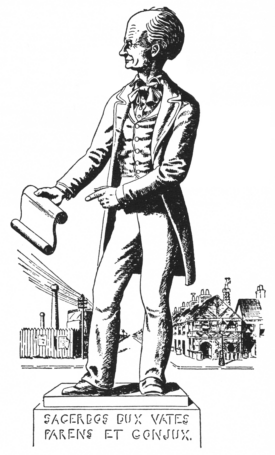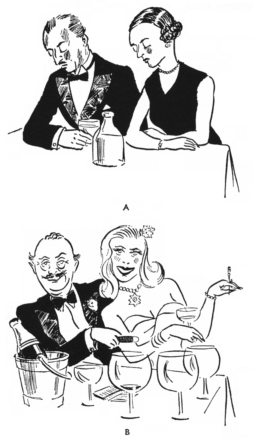
|
Excerpts fromGamesmanshipStephen Potter |
A QUEER MATCH
No, the OGs don’t take themselves too seriously. And what a good thing that is! I had the good fortune to be present at the celebrated badminton match between G. Odoreida and the Yugo-Slav champion Bzo in the West Regional Finals – one of the longest games I have ever watched. Both were poor players. Both were at the height of their gamesmanship powers. The match started a good hour before the game began. Odoreida kept Bzo’s taxi waiting twelve minutes and then was short of change when the time came for payment. But the younger player succeeded in exacting his share and came out of it a shilling to the good, only to find himself one rum and orange to the bad on the drink exchange before their sandwich lunch. In the changing-room Bzo prettily pleaded a cut on the palm of his right hand, which he had swathed elaborately in a special grip-improving elastoplast earlier in the morning. Odoreida Frith-Morteroyed in reply, displaying his little finger, the top joint of which was missing. ‘Jet plane,’ he said. ‘The skin has just healed.’ This was dangerous, for many of us knew that the accident happened thirty-five years ago, when Odoreida caught his finger in the chain of a toy tricycle.
The game itself started with some efficient crowd play. Odoreida opened by exchanging jokes with the umpire, and Bzo countered by patting the head of the shuttlecock boy and comically pretending to be hurt when a return from Odoreida hit him gently in the middle of the chest. Odoreida drew level by smashing into the net on purpose, after the umpire had (quite correctly) given a line-cock decision in his favour. The applause had hardly died down when Bzo jumped into the lead again. Odoreida had made the mistake of achieving his first hard shot of the game, and Bzo made no attempt to reach it but stood stock still, shaking his head from side to side in whimsical respect, and sporting acknowledgment of his opponent’s skill. Odoreida did well soon after this by discovering a ‘sprung string’ in his racquet and asking with delightful informality whether ‘anyone had got another bat’ as he had not got a spare. This double thrust shook Bzo for a few points, but he soon pulled himself together by asking a spectator ‘not to wave his programme about’ as it was ‘bang in his opponent’s line of sight.’ Bzo seemed in full spate. Odoreida, now badly rattled, fought back well with a couple of broken shoe-laces and a request for a lump of sugar. Thus gambit after gambit was tried, and each in turn was effectively countered. After an hour’s play they were still on the first game and the score was deuce for the sixtieth time, when suddenly Bzo came up to the net and spoke as follows:
‘Let’s’ (or ‘Why not let’s’) ‘drop gamesmanship and just play?’
Odoreida assented and the game was then played, to the end. It had, of course, lost all interest to the more understanding spectators, who were puzzled, to say the least, although a small group applauded.
At the same time, I do not feel we should blame them too heavily. For
GAMESMANSHIP CAN BE TAKEN TOO SERIOUSLY

|
| LIMELIGHT PLAY: HOW TO BE PHOTOGRAPHED IN PUBLIC. A. Right. B. Wrong. |
Stephen Potter, Gamesmanship, 1947.